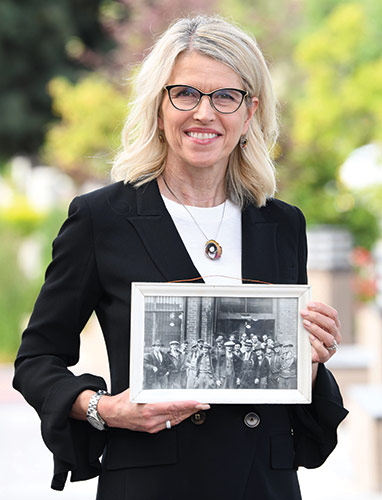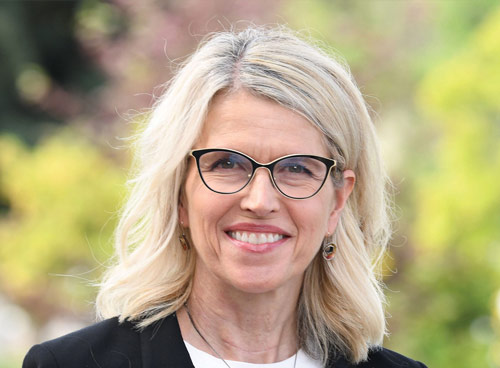Women’s History Month
Lisa Grow is the CEO of IDACORP.

It's appropriate as PUF celebrates Women's History Month that PUF talked with a couple of women in power. In this issue, we are fortunate to spend time with the CEO of IDACORP, Lisa Grow, and the COO of American Electric Power, Lisa Barton.
PUF's Steve Mitnick: You're the CEO of IDACORP and Idaho Power. How do you perceive your job and responsibilities?
Lisa Grow: It's been an interesting transition. Coming into the role last June, in the middle of a pandemic, I remember thinking we didn't know how bad this was going to be. We didn't know if the economy was going to tank. We didn't know if people were going to die. There was so much that we didn't know.
I felt like my role was to keep the company healthy financially, keep the lights on, and take care of our employees. It became a job about taking care of humans. I do care about financial results like other CEOs, but I believe if you take care of the customers and employees, then owners do well also.
In a weird way, it's been exhilarating because we've been able to push the boundaries. We got a lot of input from our workforce, because we were doing things none of us have ever done. We've got half our workforce at home, another quarter in the office because they can't do their jobs at home, and all of our people in the field.
At first, my engineering brain wanted policies. But that just blew up. We got feedback quickly saying that it's not going to work to have blanket policies for everything, so it was about listening and adjusting.
We started asking the question, what will work? Employees and our leaders came up with the best solutions, things I don't think I would've come up with. We are giving people the goals and boundaries and letting them get to work.
PUF: What's a typical day like?
Lisa Grow: There is no typical day. I try to have a plan of what needs to be done today. I like to start with a cappuccino, and I look at email. My executive assistant creates this notebook for me that is all of the week's activities, calendar, and materials I will need for each meeting.
I review that the night before, and it's my guide for the day. She also schedules time on my calendar to get organized, read, and think, because you get so filled up with meetings that it's hard to take a step back and reflect.
I've had to find new ways to connect with people. I've been virtually attending various staff meetings, leadership meetings, and all-employee meetings. I've been doing videos, blogs, and things to keep connected because I believe our culture is one of relationships, and I worry that can erode over time.
PUF: How did your background lead to this role?
Lisa Grow: My grandfather was a lineman for Idaho Power for over thirty years, starting in the late 1930s. When I was very young, I'd visit him at the building that I later started working in. It was a service center at the time. I asked a lot of questions, and maybe the seed was planted then.
But I don't think I knew what that seed was until my junior high school years, when I had a guidance counselor named Dr. Gudmundson. One day I was walking down the hall and he pulled me aside and said, hey Lisa, what do you want to be when you grow up?
I didn't know. He said, you are good at math and science and should think about engineering. As a woman, you can work in any industry, anywhere in the world, and make good money.
That sounded good. That little seed started to grow, and I cannot overstate the importance of education and encouragement. That set me on a path, and I was one of the few women in my accelerated classes.
That seed kept growing. When I graduated from high school, I wanted to go into engineering so I could work somewhere amazing and solve problems. I loved math and science. Engineering was perfect.
I went to the University of Idaho because that's what we could afford. I didn't realize what a world-class engineering program I fell into. I was interested in what was happening in Silicon Valley. Personal computers and semiconductors were fascinating to me, and I was drawn toward small signal engineering.
When I got to my senior design project, I joined a team working on an Idaho Power computer-based project. After graduation, I came back to Boise and was still planning to go to California.
Idaho Power called and asked if I wanted to finish the project and install it. I spent the summer installing the project and getting to know Idaho Power, then a job came open in communications engineering. I thought I could do that until I figured out what I wanted to do.
That was thirty years ago. I took the job, and then found out how fascinating this business is, how wonderful the people are, and how many different aspects of engineering can be applied.
This is my fourteenth job in the thirty-four years I've been here, and they've always been driven by curiosity — I suppose that same curiosity that I felt when I watched my grandfather.
It's been quite a journey, and I love a good challenge. It's always been my nature to think about my next job not knowing if I can do it, but willing to figure it out. People saw that I could solve problems and get stuff done, but I also cared about the company and the mission.
It's said that electricity is two percent of the national GDP, and I love saying that we're the first two percent. If we don't do our job, the other ninety-eight percent doesn't happen. It's an incredible responsibility, and it's also fascinating.
PUF: What advice would you have for young women? What advice would you give to men that want to help people flourish and maybe give an extra effort to have women flourish, meet their potential, and help their company grow?
Lisa Grow: Curiosity and tenacity are key. I was so used to being the only woman in a room because of the things that I found interesting. I didn't know I wasn't supposed to be there or that others might find it unusual.
I was the second woman engineer ever hired in a one hundred and four-year-old company. It required that the culture shift to accept that and embrace it and realize the value. The first woman engineer, Colleen Ramsey, was super helpful to me.
But so were a lot of supportive men, because there simply weren't many women. People encouraged me to look at other positions and projects as opportunities.
They also gave me honest guidance, some of which was hard to hear. I was all about getting the job done, and I was steamrolling people to get there. People took me aside to let me know that strategy wasn't going to work in my favor over the long-term.
During my journey of personal growth and professional development, I recognized that diversity is important. It's something that means a great deal to me now as we work to identify the barriers and biases that stop people from coming to this industry. The recruiting comes first.
But it's not enough just to get people in the door. We've got to look at how are people getting promoted? What experiences are we giving them? How are we developing them? How are we treating them?
We're asking those questions now, guided by a statement we call Our Commitment to Each Other. This year we have a diversity, equity, and inclusion group that's going to lean into these questions. Where are our barriers? Where are we not showing up?
It takes courage to say, there might be something here we need to really work on. This has been the year of having to reflect. I'm worried now, for example, that women are going to leave the workforce because of the pandemic. We have been super focused on how do we help, what does each person need, and how can we get it to them? Equity is about giving each person what they need, not giving everybody the same.
My advice for young women is to embrace challenge and don't be afraid to fail. Be tenacious. If you have an interest in the STEM fields, go with it — because we need you. We don't have enough STEM students of any category, and we all need to encourage STEM education efforts, especially for women, people of color, and other under-represented groups.
How do we get the next generation of students to come work for us? Things are changing quickly in the utility industry with the digital transformation, electrification, and clean energy. That's when we see young people get excited and want to come. We need to do a better job as an industry to recruit and show what we're doing.
I'll do everything I can to help with that and encourage those interested to pursue STEM fields. It teaches problem solving, the scientific method, and ways to look at data and form opinions. We've got a lot of problems we've got to solve. It's the math and science that solves many of them.
I love being able to mentor and answer questions. I do feel some imperative to do a good job because if I don't, it'll be a long time before the next woman gets the chance.
Women Leading Today conversations:
Category (Actual):
Department:
